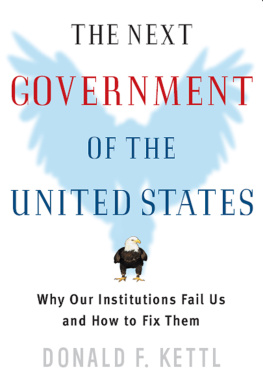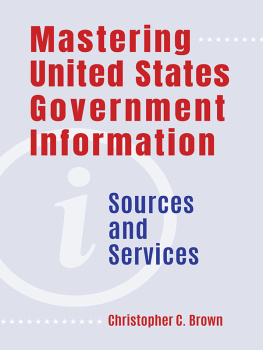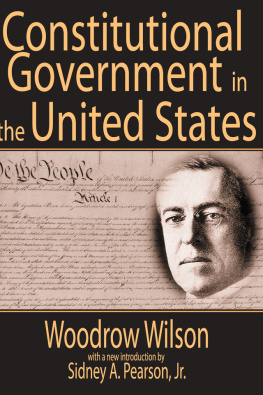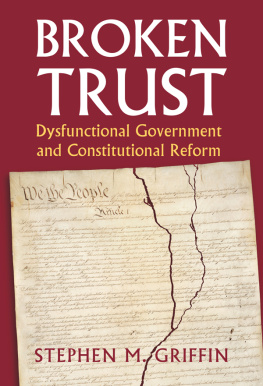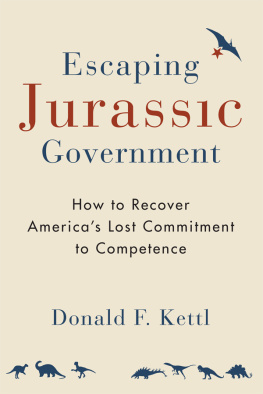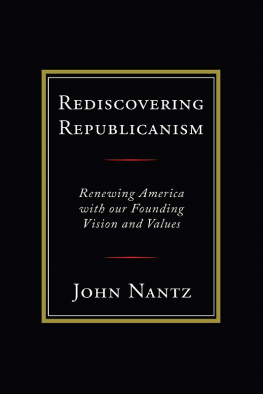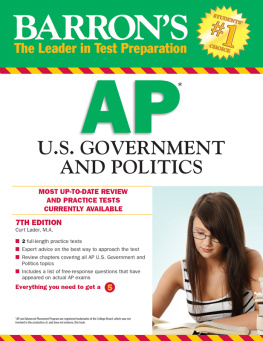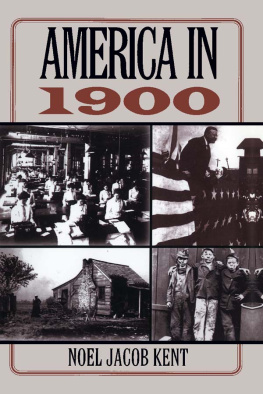THE NEXT GOVERNMENT
OF THE UNITED STATES
WHY OUR INSTITUTIONS FAIL US AND HOW TO FIX THEM
DONALD F. KETTL

W. W. NORTON & COMPANY
NEW YORK LONDON
Copyright 2009 by W. W. Norton & Company, Inc.
All rights reserved
For information about permission to reproduce selections from this book, write to Permissions, W. W. Norton & Company, Inc., 500 Fifth Avenue, New York, NY 10110
Production manager: Anna Oler
Library of Congress Cataloging-in-Publication Data
Kettl, Donald F.
The next government of the United States: why our institutions fail us and how to fix them / Donald F. Kettl.1st ed.
p. cm.
Includes bibliographical references.
ISBN: 978-0-393-07247-1
1. Administrative agenciesUnited StatesManagement. 2. Executive departmentsUnited StatesManagement. 3. United StatesPolitics and government21st century. I. Title.
JK421.K4815 2009
351.73dc22 2008038584
W. W. Norton & Company, Inc.
500 Fifth Avenue, New York, N.Y. 10110
www.wwnorton.com
W. W. Norton & Company Ltd.
Castle House, 75/76 Wells Street, London W1T 3QT
For Mildred
and all those who worked so hard to care for her
For those who suffered because of Hurricane Katrina
and those whose imagination and leadership brought them relief
CONTENTS
PREFACE
T his book evolved through a long and meandering process. It began with conversations in the late 1990s suggesting that big changes in American government were emerging but that their shape was anything but clear. The genesis continued with an observation that monumental forces periodically bring fundamental change to the workings of American government without dramatically transforming the foundation of the American system. The search for an explanation of these observations, and an effort to discern the future of American politics through the fog of great uncertainty, led to the book.
In the late summer of 2001, I began writing in earnest. On a Labor Day weekend trip back from the West Coast, I was busily composing. The last sentence I pounded on the computer before the flight attendant asked me to turn off the laptop was this: Big changes are coming. Its not clear whether they will be quiet and subtle or sudden and dramatic, but theyre coming nonetheless. A week later, the horrible events of September 11 answered that question. They also framed the books basic questions in sharper relief. Political commentators repeatedly argued that, with the terrorist attacks, everything had changed. But what had, in fact, fundamentally changed? How was the future likely to be different from the past? Were the changes likely to ripple past homeland security into other policy areas? And where were these forces likely to take American democracy?
Policy makers promised they would learn the lessons of September 11, but the painful aftermath of Hurricane Katrinas August 2005 strike on the Gulf Coast showed that the system was struggling with many of the same problems. In the midst of all these large-scale policy puzzles, my wife and I were quietly facing a series of tough decisions in caring for her mother, Mildred, whose health was deteriorating and who needed care through several government programs. All these cases shared surprising similarities that shaped a conclusion: American government was facing some tough, inescapable problems, and it was becoming painfully clear that the government we had was not a good match for the problems we were trying to solve.
I began exploring that notion with government officials, and I found surprising echoes of the same puzzles in unexpected places, from Philadelphias streets to space missions. This book grew out of my observations and conversations. The books methodology, in fact, is unusual. It is the product of an evolving dialogue with hundreds of government officials over more than a decade. I regularly lecture to government officials, and after many presentations individual government workers have come up to me with their own stories. One conversation was with a senior FBI official; another, with senior officials in the US Department of Transportation. Homeland security officials in Los Angeles and local government officials in Wisconsin shared their experiences. I am deeply indebted to my dialogues with these many government officials, at all levels, for their help in developing and refining the evidence that shapes this book.
At its core, this book is an argument, based in observations about American governmentmost important, about that governments future. Research into September 11 and Katrina injected pessimistic notes. However, the encouraging energy and innovation of so many officials, in government and among its many partners in the private and nonprofit sectors, make the book an optimistic one. Government can indeed rise to the challenges of the information age, but achieving that goal will require new ways of adapting Americas enduring pragmatism to the tough problems of the twenty-first century. Failing to rise to that challenge will only undermine the prospects that American democracy will endure. The stakes are large in building the next government of the United States.
ACKNOWLEDGMENTS
A s this book took shape along its winding course, I accumulated many debts. I am grateful to Roby Harrington at Norton for the long conversations that helped give this project shape and for his unwavering support, even when the contours of the project were anything but clear. Nortons Mollie Eisenberg provided superb editorial guidance, and Stephanie Hiebert proved an excellent copy editor. Exceptionally thoughtful reviews of the manuscript from Ron Daniels, John DiIulio, Charles Goodsell, Anne Khademian, and Donald Moynihan provided invaluable comments for sharpening the book and its argument. Both are vastly better for their keen insights and pointed suggestions.
My wife, Sue, was along for every step of this long journey. She listened to the stories, tested their lessons, and provided the touch-stone for what rang true. No one could ask for a better partner or friend.
Finally, I am indebted to the legions of officials, in government and out, who have been working to find new strategies to solve the problems they face. They are often so busy trying to figure out how to do their jobs that they might not recognize the bigger picture but, step-by-step, they have been inventing the next government of the United States.
THE NEXT GOVERNMENT
OF THE UNITED STATES
Mildred
L et me tell you about Mildred.
Mildred was a spry ninety-one-year-old, born in east Texas to a mother and father who had worked hard on the land. As a young woman, she had often spent summers in the cotton fields and moved down the rows with her eyes to the skies, imagining what it would be like to fly. After reading about Amelia Earharts adventures, Mildred decided to take flying lessons. In the barnstorming days of the 1930s, novice flying was much different from today. The aircraft were less stable and not as forgiving, and there were not many instruments beyond a couple of gauges in the cockpit and the pilots eyes. Mildred was a young widow with two very young children at the time, and her own mother was afraid that flying was a bit too much adventure. She stopped her lessons just short of her first solo flight but she never lost her taste for wings.
During World War II, Mildred worked at the Bryan, Texas, Army Air Corps base as office manager. One of the fliers rotating through the base caught her eye. He was a young lieutenant named Al, just back from forty-seven missions over Germany in a B-17 heavy bomber in the Mighty Eighth Air Force. The standard tour for B-17 crew members in the early years of the war was twenty-five missions. Especially in the first phase of the air war, German fighters often picked off bombers, and antiaircraft batteries around critical targets were fierce. The odds of winning membership in the Army Air Corpss Lucky Bastards Club, an honor bestowed upon fliers who made it through those twenty-five missions, were lowjust one chance in five, according to some estimates.1 Al completed his twenty-five missions and then flew twenty-two more, before being shipped back to the States for a breatherand to be retrained for what many analysts feared would be a brutal Pacific campaign.

